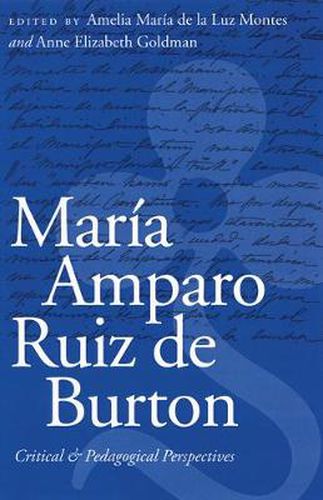Readings Newsletter
Become a Readings Member to make your shopping experience even easier.
Sign in or sign up for free!
You’re not far away from qualifying for FREE standard shipping within Australia
You’ve qualified for FREE standard shipping within Australia
The cart is loading…






Since the recent republication of her novel The Squatter and the Don, Maria Amparo Ruiz de Burton (1832-95) has become a key figure in the recovery of nineteenth-century Mexican American literature. An aristocratic Californiana, she championed the rights of Mexican Americans in novels, plays, and letters. Her 1885 novel called attention to the illegal appropriation of Mexican land by the United States government, and she critiqued the political mores of America after the Civil War in light of the Mexican-American war. Her keen assessment of corporate capitalism at the end of the nineteenth century, frank acknowledgment of feminine desire, and deft insights about economic realities and class relations were unique among her American peers. Using Ruiz de Burton’s work to analyze the critical schism conventionally imposed on nineteenth-century literary culture in America, the essays in this collection also draw connections between her work and the contemporary Chicana and Chicano canons. At once richly historical and critically nuanced, these essays appraise a politically complex Mexican American writer alternately celebrated as marginalized and censured for her identification with a social elite. This volume includes a section on pedagogy that offers a discussion of teaching approaches, syllabi, discussion questions, and assignments.
$9.00 standard shipping within Australia
FREE standard shipping within Australia for orders over $100.00
Express & International shipping calculated at checkout
Since the recent republication of her novel The Squatter and the Don, Maria Amparo Ruiz de Burton (1832-95) has become a key figure in the recovery of nineteenth-century Mexican American literature. An aristocratic Californiana, she championed the rights of Mexican Americans in novels, plays, and letters. Her 1885 novel called attention to the illegal appropriation of Mexican land by the United States government, and she critiqued the political mores of America after the Civil War in light of the Mexican-American war. Her keen assessment of corporate capitalism at the end of the nineteenth century, frank acknowledgment of feminine desire, and deft insights about economic realities and class relations were unique among her American peers. Using Ruiz de Burton’s work to analyze the critical schism conventionally imposed on nineteenth-century literary culture in America, the essays in this collection also draw connections between her work and the contemporary Chicana and Chicano canons. At once richly historical and critically nuanced, these essays appraise a politically complex Mexican American writer alternately celebrated as marginalized and censured for her identification with a social elite. This volume includes a section on pedagogy that offers a discussion of teaching approaches, syllabi, discussion questions, and assignments.